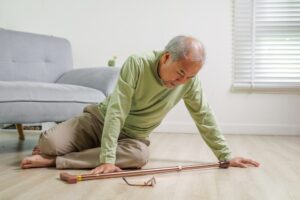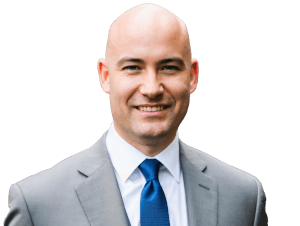
Yes, you can sue a nursing home for a fall that resulted in a serious injury if the fall was caused by negligence, abuse, or failure to meet the required standard of care.
Nursing homes have a legal duty to keep residents safe, and when they fail, you can hold them liable.
However, not every fall leads to liability. You may not be able to sue successfully if the fall was accidental, the nursing home followed proper care standards, or the resident refused help or ignored medical advice. When in doubt, it is smart to consult an elder law attorney.
Our Georgia nursing home falls lawyers have recovered millions of dollars on behalf of injured nursing home residents and their families. Call today to schedule a free consultation and tell us about your case.
When You Can Sue a Nursing Home for a Fall
If you can link your loved one’s fall and injury to negligence by the nursing home, you may have grounds for a lawsuit. Some examples of possible negligence on the part of the home can include:
Lack of Supervision and Support
Residents known to be at high risk for falling require supervision and assistance with mobility. In some cases, devices such as chair alarms may be part of their care plan. If staff fail to provide supervision or ignore call bells and alarms, they may be legally liable.
Dangerous Environmental Factors
This can include anything that creates hazards or violates safety standards, such as slick floors, missing or broken handrails, or inadequate lighting. If staff do not identify and address these risks, their neglect could lead to a legal claim.
Staffing Issues
Untrained or insufficient staff increases the risk of falls due to inadequate monitoring. Improper use of walkers, wheelchairs, or bed rails also leads to accidents, especially if staff don’t know how to assist residents correctly.
Inadequate Response to Emergencies
Delayed medical care after a fall can significantly worsen a resident’s injuries and may strengthen your legal case. This delay may indicate a broader issue of negligence in staff training, communication, or emergency procedures.
Failure to Provide Care
If the nursing home failed to assess the injury quickly, notify medical professionals, or arrange timely hospital transport, it can be seen as a serious breach of their duty of care. Courts often view delayed care as a preventable failure that justifies legal accountability.
How to Prove the Nursing Home Is at Fault
To sue a nursing home for a fall that resulted in a serious injury, you or your attorney must prove that the nursing home’s actions or lack of action directly caused the injury. This involves several legal elements:
- Duty of Care: The nursing home must provide a safe environment and appropriate care. This duty exists in nearly all resident relationships.
- Breach of Duty: You must show the facility failed to meet its responsibilities by ignoring safety protocols, neglecting care plans, or allowing hazardous conditions.
- Causation: It’s not enough that the facility was careless; there must be a clear link between the nursing home’s actions and the injury.
Together, these elements form the foundation of a successful negligence claim. Without them, even a severe injury may not result in liability. Your attorney can collect and present the evidence needed to support your case.
Important Actions After a Nursing Home Fall and Injury
When a loved one falls in a nursing home, your actions can protect their health and legal rights:
- Take detailed notes about the fall, such as the date, time, location, and who was present.
- Record any visible injuries, changes in condition, or behavior. Take photographs if possible.
- Speak with nursing home staff and ask for their account of what happened, and keep a written log of the conversation.
- Request copies of the incident report and your loved one’s full medical records, including updates made after the fall.
- Avoid confrontations, but document any resistance or inconsistencies in the staff’s story.
- In Georgia, if you believe the fall is due to abuse or neglect, you may file a complaint with the Healthcare Facility Regulation Division of the Georgia Department of Community Health.
- If it’s allowed by the home, seek a medical evaluation from an outside provider to ensure accurate diagnosis and care.
- Consult with an attorney experienced in nursing home negligence.

Get Help With Your Nursing Home Injury Case
While you can sue a nursing home for a fall that results in a serious injury on your own, it is usually wise to reach out to an elder law attorney. An attorney can guide you through complex legal and medical issues.
Your lawyer can gather crucial evidence, handle negotiations with the facility or insurers, and help maximize compensation, giving you the best chance at holding the nursing home accountable for negligence.
At Schenk Nursing Home Abuse Law, we take nursing home abuse and neglect very seriously, and we’re here to provide the support and legal expertise you need during a difficult time.
Call today to schedule a free consultation and tell us what happened.





